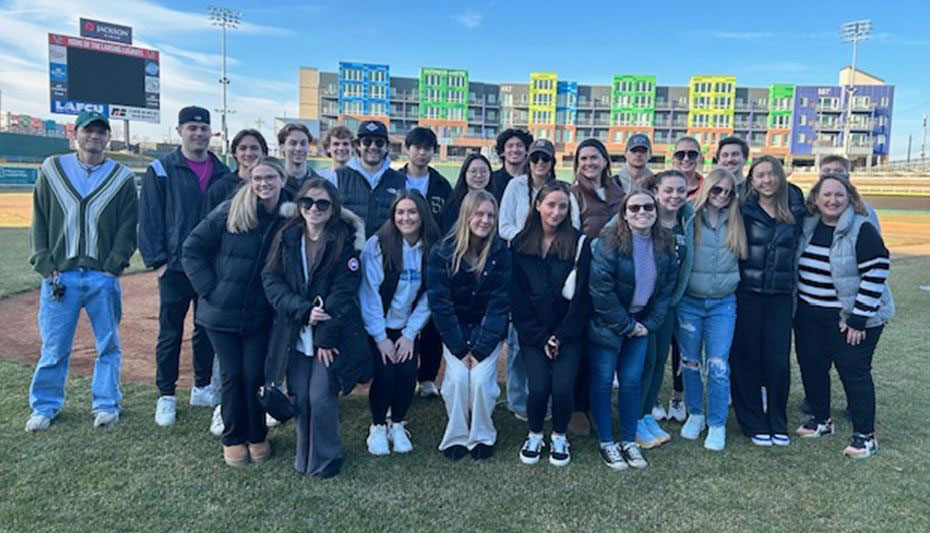
The next time you go to a Lansing Lugnuts baseball game, you may just see an advertisement or promotion created by Michigan State University students.
This past spring, students in Tiffany Wahl’s advertising management class — the senior capstone class for advertising majors — worked with the Lugnuts to develop a campaign for its Lansing Locos initiative to reach and engage the local Hispanic community.
The initiative transforms the Lansing Lugnuts into the Lansing Locos for seven games this year as part of Copa de la Diversión, a season-long event series specifically designed to embrace the culture and values that resonate most with minor league baseball teams’ local U.S. Hispanic communities. In Lansing’s case, the Hispanic community represents 13% of the city’s population.
“East Lansing and Lansing — we’re neighbors. Any way that we can connect with Michigan State and the Spartan community helps us grow, and we love partnering with MSU,” said Amanda Rich, marketing and fan engagement manager with the Lugnuts.
Wahl contacted Rich after hearing about the Locos initiative from a student who interned with the team. Despite spring being the team’s busiest time of year, with Opening Day and the Crosstown Showdown against MSU’s baseball team, Rich agreed to partnering because she knew Wahl’s students would propose useful and creative ideas. The students delivered, with propositions including a new Locos slogan, promotional food and drink menu, and social media graphics and videos.
“Many of our students are interested in sports and sports management and sports marketing,” Wahl said. “I wanted to show them how you market a minor league baseball team because it’s very different to enjoy sports and enjoy watching sports versus working in sports.”
Wahl also said she likes working with local clients because it allows students to make a tangible impact in the community and it opens students’ minds up to other opportunities in advertising besides working for large corporations or agencies. Some of her past clients for the advertising management capstone include Downtown Lansing, Inc., Moneyball Sportwear (owned by Lansing Everett alumnus and former professional basketball player Desmond Ferguson), Capital Area Transportation Authority and the Lansing Mall’s ZapZone.
“I try to think of clients that are interested in working with us and could use our help, and that the students will find value in,” she said.

In the advertising capstone, students are placed into groups designed to resemble an ad agency and are tasked with developing a campaign for a specific client throughout the semester. These campaigns have multiple elements, including market research, social media, advertising, events and promotions, graphic design and media outreach.
The agency groups conduct most of the work on their own but have check-ins with Wahl and the client two to three times per semester. At the end of the class, each group gives a final presentation highlighting the key components of their proposed campaign.
“It is meant to be an augmentation of all of the skills that they’ve learned in the major put into practice,” said Wahl. “Within their groups, students can choose work that aligns with their strengths or challenge themselves to try something new: I tell my students this class is a great opportunity to refine their skills before they graduate.”
Recent graduate Ellie Harner, who would often attend Lugnuts games during her time at MSU, said the hands-on experience of the class was valuable.
“I feel like I really learned how to put a campaign together. This is what people really do. Putting the presentations together and working with people we hadn’t met before and growing our ideas — and ourselves and our skills along the way — was really helpful,” Harner said.
Wahl said she hopes working with a real client to create a campaign gives students confidence as they enter the workforce.
“I see myself as the bridge between the classroom and industry. In this class, above all the other classes that I teach, I really see a transformation in the students from the beginning to the end,” she said. “I ask them at the end: ‘What did you learn? Do you feel like any of your skills developed further?’ The students say, ‘I learned skills that I didn’t even know I needed in this class. I feel like I’m prepared to go out into the world.’ That’s my goal as an educator.”